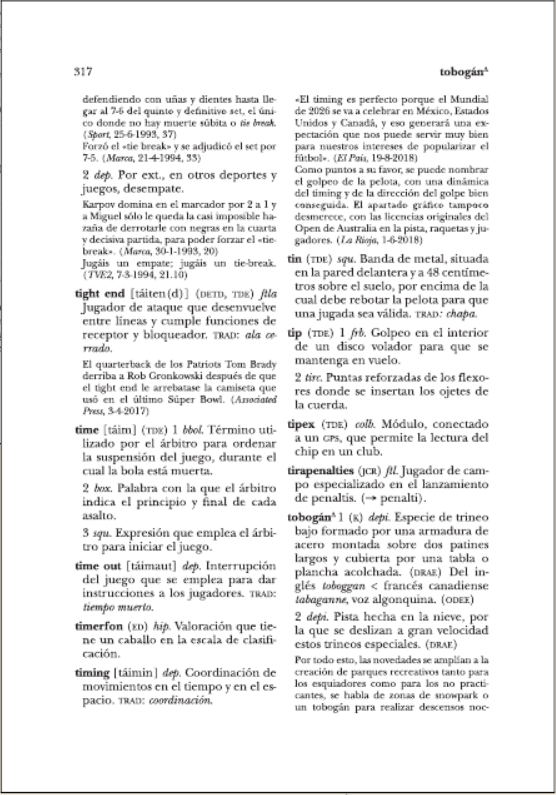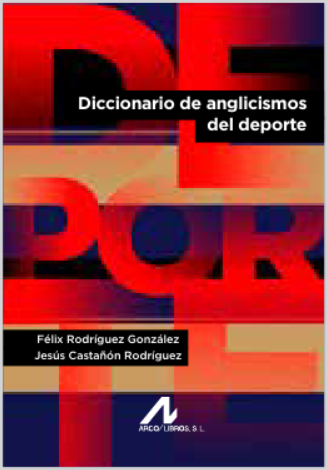| ARABIC |
CHINESE |
domain |
| زوجي السابق |
前夫 |
|
| عقاب بالسجن عشرين سنة |
判二十年的牢狱 |
|
| مقطوعة موسيقية كلاسيكية لباخ |
巴特前奏曲 |
music |
| ملأ دجاجة بالحشوة |
把一只鸡塞满馅料 |
culinary |
| رسم دائرة |
画圆 |
geometry |
| طرد شخصا ما من دولة |
将某人从国家中驱逐 |
|
| مفرد وجمع كلمة |
一个词的单复数 |
grammar |
| عمل حاصل جمع عدة أرقام |
做几笔数目的总额 |
mathematics |
| رياح شمالية |
北风 |
|
| منظر خيالي |
不真实的景象 |
|
|
|
|
| ARABIC |
DANISH |
domain |
| السفارة الألمانية في باريس |
den tyske ambassade i Paris |
politics |
| قامت الشرطة بالقبض على المجرم. |
Politiet har fanget forbryderen. |
law |
| تقع برلين على دائرة عرض 52 درجة شمالاً وعلى خط طول 13 درجة شرقًا. |
Berlin ligger omtrent på 52 grader nordlig bredde og 13 grader østlig længde. |
geography |
| تمركز كل المشتركين على خط الانطلاق. |
Alle konkurrencedeltagerne står på startlinjen. |
sport |
| قطة أليفة |
en tillidsfuld kat |
|
| حزمة من الفجل/الثوم |
et bundt purløg/radiser |
|
| قانون الجاذبية |
tyngdeloven |
mathematics, physics |
| “لقد فعلها!” – “كم هذا مبهر، خاصة مع كل المساعدة التي تلقاها!” |
“Han klarede det!‟ – “Det tror pokker, med al den hjælp, han har fået!‟ |
|
| بذور دوار الشمس |
solsikkekerne |
botanics |
| اشتد السيل على نحو مخيف، لكن هذا الرعب انتهى بعد دقائق معدودة. |
Det haglede frygteligt, men efter et par minutter var ubehaget overstået. |
|
|
|
|
| ARABIC |
DUTCH |
domain |
| أغنية من ألبومها الغنائي الجديد |
een lied uit haar laatste album |
music |
| مراسلنا في المنطقة المنكوبة |
onze verslaggever uit het crisisgebied |
journalism |
| عش السنونو |
zwaluwennest |
zoology |
| الولايات المتحدة الأمريكية وحلفائها |
de USA en haar bondgenoten |
politics |
| يضخ القلب الدم عبر الأوعية الدموية. |
Het hart pompt het bloed door de aderen. |
anatomy |
| المفعول به يكون في حالة النصب. |
Het directe object is accusatief. |
grammar |
| روض نمرا |
een tijger temmen |
|
| نشر خبرا |
een bericht verspreiden |
|
| دراسة الحقوق |
rechten studeren |
|
| مثل صيني |
een Chinees spreekwoord |
|
|
|
|
| ARABIC |
ENGLISH |
domain |
| فيلم روائي |
feature film |
cinema, television |
| حالة طقس هادئة |
calm weather |
meteorology |
| الفيلم عبارة عن تقليد هزلي لأفلام الغرب الأمريكية القديمة. |
The film is a parody of the old Hollywood westerns. |
television |
| في عالم الطيور تكون الإناث في الغالب أقل لفتا للأنظار من الذكور. |
With birds the females are often less spectacular than the males. |
zoology |
| الجهاز العصبي |
the nervous system |
anatomy |
| أحمل لك رسالة مفرحة! |
I have good news for you! |
|
| لقد ضيعت مفتاحها مرة أخرى. |
She has lost her keys again. |
|
| لا يمكن بأي حال من الأحوال أن تلحق بالقطار. |
You can’t possibly catch the train now. |
|
| هل يُسمح بالتخييم هنا؟ |
Are you allowed to camp here? |
|
| ما الغرض من هذا الإجراء؟ |
What is the purpose of this measure? |
|
|
|
|
| ARABIC |
FRENCH |
domain |
| شريان الرئة |
l’artère pulmonaire |
anatomy |
| تم اصدار الحكم. |
Le jugement a été prononcé. |
law |
| ألآلهة القدماء |
les dieux de l’Antiquité |
religion |
| العصر الحجري |
l’âge de la pierre |
history |
| ألركود الاقتصادي عام 1929 بالولايات المتحدة |
la dépression de 1929, aux États-Unis |
|
| رئيس الحكومة |
le chef du gouvernement |
|
| كم هو أجرك؟ |
Combien es-tu rémunéré ? |
|
| ما هي الخطوة القادمة؟ |
Quelle est la marche à suivre ? |
|
| !إلى اللقاء غدا |
Au revoir, à demain ! |
|
| إسمعوا جميعًا، لديّ تصريحٌ أدليه عليكم! |
Écoutez tous, j’ai une déclaration à faire ! |
|
|
|
|
| ARABIC |
GERMAN |
domain |
| أفضّلُ أن أعيشَ في بلدةٍ سكّانها قليلونَ. |
Ich lebe lieber in einer Stadt mit wenig Einwohnern. |
geography |
| بَنَّجَ الطّبيبُ المريضَ قبلَ العمليّةِ الجراحيّةِ. |
Der Arzt anästhesierte den Patienten vor der chirurgischen Operation. |
medicine |
| جماعات متطرفة |
radikale Gruppen |
politics |
| نخاع العظام |
Knochenmark |
anatomy |
| بطاطس مهروسة |
Kartoffelpüree |
culinary |
| سمعنا محاضرةً منْ أستاذِ الكيمياءِ. |
Wir haben einen Vortrag vom Chemieprofessor gehört. |
school |
| هل تصحبُني في جولتي؟ |
Wirst du mich auf meiner Reise begleiten? |
|
| متى تُغلَقُ الحوانيتُ؟ |
Wann schließen die Geschäfte? |
|
| سوف أدعُكَ وشأنَك، فافعلْ ما تراهُ مناسبًا! |
Ich werde dich in deiner Angelegenheit in Ruhe lassen, also tu was du für richtig hältst! |
|
| هس! ماذا كان هذا الصوت؟ |
Pst! Was war das für ein Geräusch? |
|
|
|
|
| ARABIC |
GREEK |
domain |
| مدرسة ابتدائية |
δημοτικό σχολείο |
school |
| أداة التعريف والتنكير |
οριστικά και αόριστα άρθρα |
grammar |
| الجهاز العصبي |
το νευρικό σύστημα |
anatomy |
| رست السفينة في الليل. |
Το πλοίο άραξε το βράδυ. |
nautical |
| تحجب الغيوم الشمس. |
Σύννεφα κρύβουν τον ήλιο. |
meteorology |
| القرن العشرون |
ο εικοστός αιώνας |
|
| ما معنى هذه الكلمة؟ |
Τι θέλει να πει αυτή η λέξη; |
|
| !ستكون هنا؟ -طبعا |
Θα είσαι εκεί; – Βεβαίως! |
|
| !أيها النادل، فنجان قهوة من فضلك |
Γκαρσόνι, έναν καφέ παρακαλώ! |
|
| لا تفرط باستعمال المنومات! |
Μην κάνετε κατάχρηση υπνωτικών! |
|
|
|
|
| ARABIC |
HEBREW |
domain |
| فحص حمل |
בדיקת היריון |
medicine |
| كأس العالم |
גביע העולם |
sport |
| سلاسل جبال الألب |
רכסי האלפים |
geography |
| كانت العملية الجراحية ناجحة. |
הניתוח עבר בשלום. |
medicine |
| تحجب الغيوم الشمس. |
עננים מסתירים את השמש. |
meteorology |
| عفوا؟ لم أفهم. |
סליחה? לא הבנתי. |
|
| سأستأنف الحديث، إلى أين وصلت؟ |
אני ממשיכה, איפה הייתי? |
|
| تقع هذه المدينة شمالي البلاد. |
העיר הזו נמצאת בצפון המדינה. |
|
| يستقبل الطبيب حسب موعد فقط. |
הרופא מקבל לפי הזמנת תור מראש. |
|
| بإمكانك أخذ جميع الكتب باستثناء هذا الكتاب. |
את יכולה לקחת את כל הספרים, פרט לזה. |
|
|
|
|
| ARABIC |
ITALIAN |
domain |
| عطل بالشبكة الكهربائية |
un guasto di zona |
electricity |
| سوق العمل |
il mercato del lavoro |
economics |
| كعكة محشوة بالتفاح |
un fagottino alle mele |
culinary |
| ورم سرطاني |
neoplasia |
medicine |
| درجات حرارة تحت الصفر |
temperature sotto lo zero |
meteorology |
| ما هو عنوان هذه الرواية؟ |
Come s’intitola questo romanzo? |
|
| كم هذا جميل! |
Com’è bello! |
|
| مدينة مكتظة |
una città sovraffollata |
|
| شركة خاصة |
una società privata |
|
| حزب اشتراكي |
partito socialista |
|
|
|
|
| ARABIC |
JAPANESE |
domain |
| أحصى 23 يورو من فئة العملات الصغيرة. |
23ユーロになるまで数(かぞ)える |
|
| ساعة ونصف |
1時間半(いち・じかん・はん) |
|
| خلق جوًا لطيفًا. |
居心地(いごこち)のいい雰囲気(ふんいき)を醸(かも)し出(だ)す |
|
| من عليه تسديد الضربة الأولى؟ |
誰(だれ)がサーブ? |
sport |
| إجراءات طلاق |
離婚(りこん)手続き |
law |
| فحص إيجابي |
陽性反応(はんのう) |
medicine |
| عازف البيانو يرافق المغنية. |
男性(だんせい)のピアニストが女性歌手(じょせいかしゅ)の伴奏をする。 |
music |
| موسيقى البوب بتأثيرات كلاسيكية |
クラシックをベースにしたポップス |
|
| شرائح رقيقة |
薄切(うすぎ)り |
|
| قفز بالماء من موضع الغطس الثالث |
3番目(さんばんめ)の飛び込み台(だい)から飛び込む |
|
|
|
|
| ARABIC |
NORWEGIAN |
domain |
| حيوانات الغابة |
jungelens dyr |
|
| الدعوة إلى المقاطعة |
oppfordre til boikott |
politics |
| أسلوب عمل بطيء، لكن ممنهج جدًا |
en langsom, men svært systematisk arbeidsmetode |
|
| لحظات السعادة التي لا تقدر بثمن |
ubetalelige lykkeopplevelser |
|
| دول الاتحاد الأوروبي |
EU-landene |
politics |
| “بأي ثمن تريد بيع السيارة؟” – “أنا آسف، لكنها ليست معروضة للبيع.” |
“Hvor mye vil De ha for den bilen?” – “Dessverre, den er ikke til salgs.” |
|
| مادة مُشعة |
strålefarlig material |
physics |
| زاوية بثلاثين درجة |
en tretti graders vinkel |
geometry |
| !عيد ميلاد سعيد |
Gratulerer med dagen! |
|
| لا داعي لأن تقلق، سيسير كل شيء بخير! |
Du behøver ikke være redd, alt kommer til å gå bra! |
|
|
|
|
| ARABIC |
POLISH |
domain |
| سيارة غير قابلة للاستعمال |
samochód nie nadający się do użytku |
|
| فحص دم |
analiza krwi |
medicine |
| اذن، انت ترفض المجيء؟ |
Więc odmawia pan przyjść? |
|
| ماذا تفعل في أوقات فراغك؟ |
Co robisz w wolnych chwilach? |
|
| !شكرا على تفهمك |
Dziękuję za pańską wyrozumiałość! |
|
| يدلي بصوته لتيار اليمين |
głosować na prawicę |
politics |
| لعبة ملاكمة |
walka bokserska |
sport |
| هو يقبل الدفاع عن هذه القضية. |
Zgodził się bronić tej sprawy. |
law |
| إقتصاد بلد |
gospodarka kraju |
economics |
| سباق دراجات |
wyścig kolarski |
sport |
|
|
|
| ARABIC |
PORTUGUESE BRAZIL |
domain |
| تحسين الدورة الدموية بالسيقان |
melhorar a circulação das pernas |
medicine |
| الأميرة الحسناء والأقزام السبعة |
Branca de Neve e os Sete Anões |
mythology |
| كلمة مكونة من أربعة حروف |
uma palavra com quatro letras |
linguistics |
| استخدام أكياس الرمل لتحصين الشاطئ |
sacos de areia para a fortificação das margens |
|
| تعليمات الأمان للعاملين عند التعامل مع المواد الخطرة |
uma instrução de segurança para o pessoal sobre a utilização de produtos de risco |
|
| إجراءات أمنية للتعامل مع المواد الكاوية |
medidas de segurança para o manejo de substâncias corrosivas |
chemistry |
| صار فقط يتفوه بسخافات بدلاً من أن يساعد. |
ficar só falando besteira, em vez de ajudar |
|
| أعِد لي قلمي من فضلك! |
Devolva-me a minha caneta, por favor! |
|
| يجب أن نخرج معا مرة أخرى. |
Devíamos sair de novo juntos. |
|
| لم يبد أي مقاومة عند اعتقاله. |
Ele não ofereceu resistência à prisão. |
|
|
|
|
| ARABIC |
PORTUGUESE PORTUGAL |
domain |
| أداة التعريف والتنكير |
os artigos definidos e indefinidos |
grammar |
| اندفاع كهربائي |
um impulso eléctrico |
technical |
| مضرب تنس |
uma raquete de ténis |
sport |
| استئصال ورم |
a ablação de um tumor |
medicine |
| اعتناق الإسلام |
conversão ao Islão |
religion |
| قطة صغيرة |
um gato jovem |
|
| كفاح ضد العنصرية |
a luta contra o racismo |
|
| تفادي ساعات الزحمة في قطار الأنفاق |
evitar as horas de grande afluência no metro |
|
| حمل الحقائب في صندوق السيارة |
carregar as bagagens no porta-bagagens |
|
| كم هو أجرك؟ |
Quanto é que és pago? |
|
|
|
|
| ARABIC |
RUSSIAN |
domain |
| إلى حياة الخلود |
наве́чно |
|
| صديق عزيز |
о́чень дорого́й друг |
|
| قطع الدائرة الكهربائية |
отключи́ть электри́чество |
electricity |
| الحياة الروحانية |
духо́вная жизнь |
|
| كيس شاي |
паке́тик ча́я |
|
| الخامس عشر من مايو أيار أي يومان قبل مغادرتي |
и́ли 15 ма́я, и́ли за два дня до моего́ отъе́зда |
|
| مرافقة عازف الكمان |
аккомпаниа́тор скрипача́ |
music |
| تطابق اسم المفعول |
согласова́ние прича́стия проше́дшего вре́мени |
grammar |
| تأخّر في الطريق |
задержа́ться в пути́ |
|
| أنهيتُ. – هكذا مبكّرًا؟ |
Я зако́нчил. -Уже́? |
|
|
|
|
| ARABIC |
SPANISH |
domain |
| أداء الحج |
hacer una peregrinación |
religion |
| رست السفينة في الليل. |
El navío atracó en la noche. |
nautical |
| لاعب تنيس |
un jugador de tenis |
sport |
| مشاهدة الأخبار الإقليمية |
mirar las actualidades regionales |
television |
| قراءة صورة أشعة |
leer una radiografía |
medicine |
| شحن بطارية محمول |
cargar la batería de un teléfono portable |
electricity |
| أنت هنا، هذا هو الأهمّ. |
Estas aquí, es lo principal. |
|
| تسببت النيران بسبب تماس كهربائي. |
El fuego fue causado por un corto circuito. |
|
| تناولت العشاء وذهبت الى السينما فيما بعد. |
Cené, después fui al cine. |
|
| من يجب أن أسأل؟ |
¿A quién debo preguntar ? |
|
|
|
|
| ARABIC |
SWEDISH |
domain |
| زبادي بدون إضافات صناعية |
en yoghurt utan konstgjorda tillsatser |
|
| الخطورة السياسية للموضوع |
det politiska sprängstoffet hos en fråga |
|
| مصاب بحساسية من شعر القطط |
vara allergisk mot katthår |
medicine |
| محلول ملح مركز |
en koncentrerad saltlösning |
chemistry |
| أبلغ المارَّة الشرطة. |
Förbipasserande fotgängare larmade polisen. |
|
| كان قد هزم الإمارات في شرق البلاد، وبذلك وحد المملكة. |
Han besegrade furstendömena i östra delen av landet och förenade på så sätt landet. |
|
| الهرب من الاضطهاد السياسي والتعذيب |
flykten från politisk förföljelse och tortyr |
politics |
| ضاعت ثلاث نقاط مباراة في المجموعة الرابعة. |
missa tre matchbollar i fjärde set |
sport |
| زرع الذرة |
odla majs |
botanics, agriculture |
| لا أكاد أجد فرصة للقراءة على مدار الأسبوع، لكن في عطلة نهاية الأسبوع أعوض كل ذلك. |
Under veckan hinner jag knappt läsa, men jag tar igen det över helgen. |
|
|
|
|
| ARABIC |
TURKISH |
domain |
| العروس والعريس |
gelin ve damat |
|
| تسجيل مبلغ من المال |
bir meblağın kaydı |
economics |
| القرود في حديقة الحيوان |
hayvanat bahçesindeki maymunlar |
zoology |
| صورة عارية |
çıplak fotoğraf |
art |
| يلعب في مركز الهجوم |
hücum bölgesinde oynamak |
sport |
| خس مزروع في حديقته الخاصة |
kendi bahçesinde yetiştirilmiş marul |
botanics |
| سوف أعود في حوالي الساعة السادسة. |
Saat altı gibi dönerim. |
|
| اللوحة للفنان مانت أو مونت أو شيء من هذا القبيل. |
Bu tablo Manet’in mi, Monet’in mi, öyle bir şey. |
|
| يستطيع الرجال أن ينجبوا حتى مع تقدمهم في السن. |
Erkekler ileri yaşlarda dahi çocuk yapabiliyorlar. |
biology |
| بدون الأشخاص المكلفين بالخدمة المدنية، كانت دار الرعاية ستُغْلق. |
Sivil hizmet görevlileri olmasa huzurevi kapatmak zorunda kalırdı. |
history |





